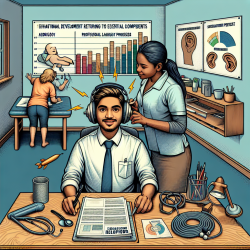Understanding the Impact of Moral Distress and Secondary Traumatic Stress
In the field of mental health, moral distress and secondary traumatic stress syndrome (STSS) are significant concerns for healthcare professionals, including those involved in child therapy. The research article "Exploration of the Association between Nurses' Moral Distress and Secondary Traumatic Stress Syndrome: Implications for Patient Safety in Mental Health Services" provides valuable insights into these phenomena. By understanding the implications of moral distress and STSS, practitioners can enhance their therapeutic approaches and improve outcomes for children receiving therapy.
Key Findings from the Research
The study conducted a cross-sectional survey among 206 mental health nurses (MHNs) in Cyprus, revealing a positive association between moral distress and STSS. Moral distress was measured using the modified Moral Distress Scale, while STSS was assessed using the Secondary Traumatic Stress Scale. The findings indicated that moral distress is positively associated with STSS and mental distress symptoms, with the latter partially mediating the relationship between moral distress and STSS.
Furthermore, the study highlighted that moral distress often arises from the work environment, suggesting the need for organizational interventions to empower healthcare professionals. Addressing these issues is crucial for maintaining patient safety and improving the quality of care provided to children.
Implications for Child Therapy Practitioners
For practitioners in child therapy, understanding the dynamics of moral distress and STSS is essential for several reasons:
- Enhancing Empathy: Recognizing the emotional toll of moral distress can help therapists develop greater empathy towards their colleagues and clients, fostering a more supportive therapeutic environment.
- Improving Communication: Open discussions about moral distress can lead to better communication among therapy teams, ensuring that ethical dilemmas are addressed promptly and effectively.
- Promoting Organizational Change: By advocating for organizational changes that reduce moral distress, therapists can contribute to a healthier work environment that supports both staff well-being and client outcomes.
Encouraging Further Research
While the study provides valuable insights, further research is needed to explore the specific impact of moral distress and STSS in child therapy settings. Practitioners are encouraged to engage in or support research initiatives that investigate these issues within their own contexts. By doing so, they can contribute to a deeper understanding of how these phenomena affect therapy outcomes and identify strategies to mitigate their impact.
To read the original research paper, please follow this link: Exploration of the Association between Nurses' Moral Distress and Secondary Traumatic Stress Syndrome: Implications for Patient Safety in Mental Health Services.










